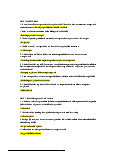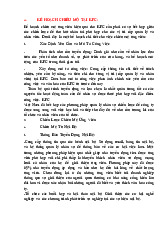




Preview text:
Journal of Accounting and Taxation Vol. 3(5), pp. 125-129, September 2011
Available online at http://www.academicjournals.org/JAT
ISSN 2141-6664 ©2011 Academic Journals
Full Length Research Paper
Investigation of the effective factors in collection of occupation tax in Iran
Seyed Mohammad Mousavi Shahroudy
Shahrood University of Technology, Iran. E-mail: mosavi.shams@gmail.com. Accepted 23 May, 2011
Occupation tax is assumed as one of the significant sources of tax collection for the revenue sources of
the government. Due to this fact, this research attempts to investigate the effective factors in the
collection of the occupation tax according to the auditors as well as the taxpayers of Iran, and so
identify the weak points as well as the potentialities of this field of activity, and also to help the tax
system to be more efficient. It should be mentioned here that the most important factors which are
investigated in this study include the computerization of the tax system, self expression program, tax
laws, the field of study of the auditors, the trust of the taxpayers and auditors for each other, and tax
allocation per capita (Nakhjiri, 2000). In this regard, the most fundamental objective of this study is to
identify and investigate the ideas and viewpoints of the taxpayers and auditors on the issues and
factors that were described earlier.
Key words: Self expression program, tax allocation per capita, allocation officers. INTRODUCTION
The tax system as a subsystem of the executive system
situation, as well as the financial policies at a macro level,
includes components such as human resources
the government needs to substantially revise its own view (managers and other employees), organization,
on the management and the issues and problems of the
institutions, processes and procedures, regulations, as
economical system and to clarify on its main advantages
well as facilities and resources in an organic and
and disadvantages as well as the threats and
reciprocal relation which guides the society towards its
opportunities of the domestic and international context.
objectives and ideals. A thorough understanding of the
During the last decade, a special emphasis has been put
tax system and the principles (norms) dominating that
on the financial policies appropriate for the economical
system, as well as the contextual and internal conditions
development in the developing countries and among
of the system can help us explain its procedural
these, the attentions have been directed towards the tax
objectives and strategies as and can also help us
policies as the main portion of the financial policies. In
regulate executive programs and would provide the
addition to the improvement of the tax revenues which
grounds for the improvement of the tax system (Nakhjiri,
can be obtained through an effective administration of
2000). Today, due to the particular internal situation, as
taxation, another factor, which can strengthen the tax
well as the international conditions of the Islamic
administration, is the inclination toward the income tax
Republic of Iran, the need for transforming the tax system
with an increasing rate, and the reasons for that can be
of the country is felt more than ever and it is essential to
investigated in the tax equity and the concept of the
regard it as one of the most essential programs of the
affordability as well as the increase of the income with an
development of the country, considering the role an
economical perception. If the tax auditors’ field of study in
appropriate and efficient tax system can play in executing
tax assignment and determination; administration is not the development plans.
properly addressed in the tax policies, that is the tax
An analysis of this issue and the outcomes of the first assignment with regard to their results and
and second development program indicates that in order
consequences, the desired results can not be achieved;
to provide the grounds for coming to a comparison and
and the reception of new taxes as the compensation for
the public trust in the management of the economic
the weaknesses and the failure in the existing tax 126 J. Account. Taxation
administration would distort the equity of the tax system.
3) Is the per capita allocation of taxes by the auditors an
So, maintaining a dynamic tax system in the process of
appropriate basis for tax assignment?
economical improvement is considered as a significant
4) Does computerization of the tax system facilitate the
factor in the elimination of wealth and redistribution of the taxation process?
revenues and finally directing the financial courses
5) Does the auditors’ field of study influence the tax
towards the required investments in the society (Arab, assignment?
1999). With the progress and improvement of culture,
6) Is the current tax law responsive to the requirements in
science and technology as well as the development of the taxation affairs?
human societies in this age, the responsibilities of the
government have also been developed and duties such
as providing the healthcare, education, housing and METHODOLOGY
welfare providing have also been added to them, and as
a result tax collection ways have also been evolved, so
The purpose of choosing a research method is that the researcher
defines what method and approach he/she takes in order to enable
that the developed countries are now equipped with an
him/her come to the possible answer(s) as soon, fast and
appropriate and advanced tax system which not only is
economical as possible (Naderi and Seif, 1999).The present study
able to establish the social justice it can also guarantee
is a descriptive research and its purpose is to describe the
all essential economical and social objectives (Hamidi,
properties of a subject matter in an exact, true and orderly manner. 1999).
The descriptive data are usually collected through questionnaires,
interviews with the experienced people, observation of the events,
With regard to the government’s financial policies which
or the documentary analysis. In other word, in descriptive surveys,
are based on the gradual departure of the economical
the researcher focuses on the investigation and definition of the
reliance of the country on the economical monopoly,
ongoing situations and sets to measure what exists and not why it
taxation can be regarded as one of the main revenue
exists. A survey is implemented to reveal the ideas, perceptions
sources of the country which can provide a great portion
and preferences of the individuals. The selected universe for this
of the government’s expenditure. On the other hand, it is study included two groups of:
particularly essential for the tax policymakers to look for a
(A) The society of the auditors; which included all job evaluators
sound and efficient tax system which can play an active
who were employed in the western district of Tehran (West Tax
role in the development and activation of several sectors
Administration); totally 250 job evaluators were determined.
of the society. Hence, the tax system’s efficiency can be
(B) Taxpayers society; which included all taxpayers working in the
improved through the investigation and analysis of the western district of Tehran.
effective factors in the tax collection; and on the other
A random sampling was chosen in this study for the sampling as
well as the members. The concept of a simplified random sampling
hand, this tax system can be made an effective system
includes the sampling in which all components of the society have
through the implementation of a sound management and
enjoyed an equal chance for being selected. In this study, the
an efficient and optimized utilization (Arman, 2000) of the
sample size was estimated by Kuchran formula through the
sources on the other hand so the purposes of this study
consideration of several factors and the preliminary study of the include:
statistical universe and adopting an appropriate potential accuracy
and the reliance of 95%. The instruments used for the data
collection in this study include questionnaire and library. The
1) The investigation and analysis of the ideas and
questionnaires applied which is prepared in concordance with the
opinions of the auditors and taxpayers on the tax
purposes of the study include a questionnaire with 20 closed penalties and punishments;
questions for the auditors and another questionnaire for the
2) The investigation and analysis of the ideas and
taxpayers with 18 closed questions. The 5-graded scale of Likert
opinions of the auditors and taxpayers on the taxpayers’
was applied for the measurement of the frequencies. self-expression plan;
To gather the information needed for the review of the literature
and the history of the related studies, a library research was used
3) The investigation and analysis of the ideas and
through the application of computerized research, domestic and
opinions of the auditors and taxpayers on the tax allocation
foreign researches related to the subject of this study. The per capita.
administration and distribution of the questionnaires was carried out
4) The investigation and analysis of the ideas and
by going to the workplaces of the auditors and handing over the
opinions of the auditors and taxpayers on the
questionnaires to them. The presence of the researcher at the time
computerization of the tax system;
of the distribution and completion of the questionnaires made it
possible to clarify on the original subject of the study, its purposes
5) The investigation and analysis of the ideas and
and significance and the way of answering the questions. In this
opinions of the auditors and taxpayers on the role of the
regard, due to the existence of 19 general auditors in the western
6) The investigation and analysis of the ideas and
districts of Tehran, the taxpayers’ questionnaires was also handed
opinions of the auditors and taxpayers on the tax law.
to the auditors of the district and they were asked to present them
to those occupation taxpayers who had a longer years of record The research questions are:
and are much more aware of the issues and then to receive the
questionnaires after being completed and return them to the researcher.
1) Do tax penalties influence the tax collection?
Accordingly, out of 157 questionnaires presented to the auditors,
2) Would the taxpayers’ self-expression plan result in the
150 were collected after leaving out the unfinished and incomplete establishment of tax equity?
questionnaires. The same number was gathered for the taxpayers. Shahroudy 127
The statistical analysis in this study was carried out at two
affordability of the nation; however, it is equally and fairly distributed
descriptive and deductive levels. At the descriptive level, the
among the nation. The traditional analysis of the tax systems has
frequency, percentage, average mean and standard deviation were
revealed many principles about taxation.
used, and at the deductive level, the statistical tests were used as
The taxes should enjoy both horizontal and vertical equity, should
follows, as fits the basic data and assumptions:
be impartial to the economical incentives, and be simple in
administration of the affairs. One of the men who were truly after a) Binomial test;
the establishment of a tax system with a definite horizontal equity b) Chi Square test ( 2 );
was named Simon. He believed that the people with an equal level x
of income should pay an equal amount of money and at the same c) Mam-Whitney U test.
time should be ranked based on the principles of the vertical equity.
Such a tax system required leaving out the other classes of taxes
The processing tools for the data included the related softwares.
and only focusing on income taxes. Nicolas Caldor, the professor
in Cambridge University strongly supports expenditure tax or Review of literature
consumption tax. He believes that it is consumption, and not the
income that is to be considered as the basis and source for tax
Prior to the twentieth century and the existence of the liberal
assignment, and that part of the income which is not consumed is
thoughts (physiocrats and classics), the governments did not
added to the national wealth as a saving and would increase the
directly intervene with the economic affairs and their responsibilities
total productive capacity. Jesus Honmer believes that taxes are the
of the governments only included the maintenance of the external
price for civilization; however the concern here is that who is to pay
and internal security and order and the establishment of the social the price.
justice. The scientists of economy following the school of the
During the last years, the public finance economists have entered
physiocrats and the classics believed in the no-interference in
some particular guidelines into the principles of the welfare
economical affairs from the part of the government. The
economy and have drawn out the criteria for an appropriate tax
foundations of the Classic school were established on the freedom
system. In this study, attempt has been made to investigate and
in business, and through the acceptance of this principle the
analyze the problems which have been turned into real barriers for
classics believed that the best governments are those who rule
tax collection in the area of the western districts of Tehran; since
less. They believed that the force of competition, profit seeking, and
the issues and concerns of the tax system are of the same nature,
the freedom of business would automatically lead the production
one can claim that the recognition of these factors in the western
and the distribution of the goods and services towards the complete
part of Tehran can be generalized to the whole tax system of the
balance and employment of the production agents. Unlike the
country, though it seems that the adjustment of some problems and
physiocrats who believed in a natural system for the fulfillment of
issues is out of the strength and power of the officials and
the social interests, the classic folk believed in following the
authorities of the western districts of Tehran and requires the
individual and personal interests among the social interests.
consideration of the senior economic and political officials.
With regard to the tragic experiences of the first half of the
twentieth century and the ideas of the socialists and the modern
scholars of the field of economy, such as Kines, on the inability of DISCUSSION
the capitalist system of economy in guaranteeing the highest level
of economic and social welfare for the society, public finance along
The results obtained from this study can be expressed as
with the duties of the government and its significance as a leader
for economy and the provision of welfare became so important for follows:
all people. The policy makers and economists spent many years to
regulate and establish some principles for steering the financial
1) The results achieved on the influence of the tax
policies. Colbert, one of the French politicians stated:
punishments on the tax collection indicates that 70% of
the taxpayers do not assume the punishments and fines
“the art of taxation is the same as the art of plucking a goose, that is
as a factor for hasting for the payment of their taxes; and
to get the highest possible amount of feathers with the least amount of cries”.
more interestingly, 76% of the tax auditors had the same
opinion about the influence of the fines in the tax
It should always be focused on how to assign a tax system, so that
collection. Also, the ineffectiveness of the tax fines in the
the economic efficiency would improve and the fair distribution of
acceptance and obedience of the taxpayers was
the revenues would be progressed. Generally speaking, a tax is
confirmed both by the taxpayers and the auditors and
often called a fair tax when the same tax is received from the
there was an agreement between both groups in this
people with the same affordability; and an efficient tax system is the
one that its expenditures are at the minimum level. Pitro Very says:
regard (taxpayers 79%, auditors 78%). Therefore, it can
be accepted that fines and punishments are not
“it should be borne in mind that it is the people who tolerate the tax
appropriate strategies for the tax collection and the tax burden”.
system has investigated the reasons for its inefficiency.
On the other hand, according to the analyses made, it
In some tax laws, the institutions and companies are considered as
people. But this is not true. According to the economists, people are
was revealed that 70% of the taxpayers consider the tax
the shareholders, workers, the lessor, and the consumer who bear
incentives as an important factor in timely payment of
the tax burden and a company cannot; and when the politicians say
their own taxes, while 74% of the auditors did not believe
that “organizations should pay their share of the tax equity” it is not
tax incentives to be appropriate tools for receiving the
clear what they mean. A nation might be directed towards a decline
moneys which should be paid to the government. This
or downfall in two ways based on the way it administers its taxes;
the first happens when the level of taxes exceeds the affordability of
distinction in the thoughts of these two groups is an
the nation and does not conform to the public wealth, and the
indicator of a wide gap in the points of view of the
second occurs when the amount of the taxes conforms to the total auditors and the taxpayers. 128 J. Account. Taxation
2) The studies carried out showed that more than 62% of
carried out in a parallel, repetitive, or even unnecessary
the taxpayers assume the self-expression plan, as an manner.
effective program in the collection of the taxes and nearly
5) About the tax laws, it was revealed that 78% of the
53% of them have counted this plan as a positive factor
taxpayers did not assume the tax laws to be sufficient for
for the establishment of a successful tax equity, while the
the needs and requirements of the tax system, and about
belief in this plan as a tool for speeding up the tax
85% of them believed that the regulations in force are not
collection process and establishment of the tax equity
clearly and explicitly defined. The opinion of the auditors
was 39.3 and 16.6%, respectively. So, it can be said that
about the insufficiency of the regulations for the
the perspective of both groups differed in this case and
requirements of the tax system was about 89% and about
this means that the auditors did not believe in the self-
the vagueness of the regulations was about 92%. So,
expression plan as an effective tool for the establishment
both groups believed that the regulations were not
of tax equity and the acceleration of the tax collection
conforming to the requirements of the tax system both in
process, but the tax payers have implicitly agreed with
their content and in their structure, and interestingly, this
this plan. If we compare this result with the answers given
belief was stronger among the auditors than the
to the question asked from both groups of taxpayers and taxpayers.
auditors, that reads: “to what extent the income tax return
of the taxpayers is established on documented facts?”,
then we would notice that 97% of the auditors consider
Suggestions of the research
the declarations of the taxpayers as unreal; hence, it can
be said that this program has not been so much
1) Creating information services centers for training the
successful as an appropriate basis for the assignment
taxpayers and familiarizing them with their duties;
and collection of taxes and until a sound bilateral relation
2) Accelerating the creation and utilization of the
and confidence is not formed between the auditors, as
comprehensive information services system for taxation;
the agents of the tax organization, and the taxpayers, this
3) Reformation of the methods and procedures for the
plan should not be expected to have its own status in the taxation affairs;
tax system; if we are going to compare this plan with a
4) Providing the conformity between the tax laws and
country like U.S., we would see that in the U.S. more regulations;
than 97% of the taxpayers deliver their income tax return
5) Reformation of the welfare affairs;
timely to the tax administration, and this not only
6) Reformation of the payment, wages and rewards
accelerates the collection procedure, but also reduces system for the auditors;
the expenditures both for the tax organization and for the
7) Reformation of the appointment and promotion of the directors. directors;
3) The results about the per capita allocation of the taxes
8) Reformation of the employment and selections.
by the auditors shows that none of the two groups of the
taxpayers and the auditors have confidence or belief in
per capita allocation of taxes; in other word,
LIMITATIONS OF THE STUDY
approximately 80% of the taxpayers do not consider the
per capita allocation of taxes as a proper criterion for the
1) One of the most basic limitations in this study, other
evaluation of the incomes subject to taxes, and nearly the
than the fact that it was a survey study, was that the tax
same number of the taxpayers did not assume per capita
districts were heterogeneous with regard to the kind of
allocation of taxes as an effective factor in establishing
jobs in that geographical area. Even though we tried to
the tax equity. The opinion of the auditors about the per
deliver the questionnaires to the most experienced
capita allocation of taxes and its conformity to the
auditors and taxpayers who were much more aware of
realities has been about 8.7% and about its effectiveness
the issues of the day; however, the lack of a
for the establishment of the tax equity has been 13.3%.
comprehensive planning system and its required
4) Concerning the results about the computerization of
essential requisites, as well as the lack of clear
the job tax system, it was revealed that more than 70% of
theoretical principles and skilled expertise in the field of
the taxpayers and auditors believed that computerization
taxation and the lack of protective information and
would accelerate the taxation affairs; however, it should
researches, has inevitably resulted in some shortages in
be mentioned that a comprehensive information system
the theoretical dimensions of the concepts, drawing
for taxation which ensures the determination of the way
inferences from the realities and the analyses as well as
of preparing and coordinating the databases, information the results and conclusions.
technology and notification, has not been clearly defined
2) Pessimistic beliefs on the research performance at all
and some measures which have been taken by the tax
organizational levels and among the taxpayers, and their
organization in a non-concentrated manner in each of the
indifference to the questionnaires and the results of the
aforementioned areas do not enjoy the required coordina- study.
tion and overlapping and in some cases have been
3) Lack of related studies in the western districts of Shahroudy 129
Tehran and lack of reliable libraries for this field of study.
Naderi E, Seif NM (1999). Research Methodology and the W ay of Its th
4) Doubt of some taxpayers in this fact, that answering
Assessment in Humanities, 16 Ed., Badr Publications: Tehran.
Nakhjiri S (2000). Effective Factors in the Success of the Occupation
these questions would not affect their job performances.
Tax Collection Based on the Opinions of Auditors and Taxpayers of
Ardebil, M.A. Thesis, Governmental Management Training Center, P. 9. REFERENCES
Arab M (1999). IBFD Tax Research Institute. A. Tax J. issue, 28: 10.
Arman B, Moazen GM, Amir AA (2000). Economic Novelties. 97: 27.
Hamidi M (1999). Analysis of the Job Incomes during the second
Economic Development Program, M.A. thesis, Fac ulty of Economic Affairs Publications: Tehran.
IBFD Tax Research Institute (2000). Translated by Arab Mazar, A. Tax J. Issue., 28: 10.




